
Author: Alexis Comninos
Travel restrictions, large-scale event cancellations, quarantines, entire cities, regions, countries in lock-down – here are some of the restrictive measures governments across the globe have put in place to tackle the deadly spread of the new coronavirus (COVID-19). Such measures have not spared persons deprived of liberty – far from it.
Some authorities have for example suspended all detainees’ rights to receive family visits, or to undertake any activity in contact with outside persons.
In Iran, in a move to reduce the risk of contamination, the authorities have taken the unusual measure of releasing 70’000 detainees – thus raising some serious, more general questions around non-custodial alternatives to detention.
Such emergency situations put things into perspective. In the face of tragedy, we tend to challenge norms and principles we held as fundamental; we also tend to question the merits of our set ways and practices. While such challenges and questions may give rise to welcome reflections and developments, we must not fall prey to relativism nor compromise on human rights.
It appears logical – even laudable – for authorities to take decisive action to prevent COVID-19 from breaking out in detention facilities. Many elements lead us to believe that such an outbreak would have devastating consequences. We in fact know that those deprived of liberty, are de facto more vulnerable to viral contamination. COVID-19 is no exception. This virus, like many others, can spread quickly in closed spaces. Particularly when such spaces are crowded, or over-crowded. In China, the authorities have already reported over 500 cases in prison. In addition, chronic and infections conditions such as diabetes, hepatitis, HIV, or tuberculosis are more prevalent in the prison context than outside. It has been documented that such pre-existing conditions considerably increase the risk of dying when infected by COVID-19.
In Italy, authorities have taken decisive ‘lock-down’ measures applicable to the entire country, as well as specific restrictive measures for the penitentiary system. Such measures include the temporary suspension of all family visits and activities with outside persons, such as sport, professional or vocational training. Following rights groups demands, some of these measures have been mitigated by alternative arrangements, such as extended phone call privileges (10 to 20 min daily) the use of video-conference calls, and even home detention in certain circumstances. Despite such efforts, prison protests sparked by the announcement of the restrictive measures have already led to the death of several prisoners. The representative of the Italian National Preventive Mechanism (NPM) pointed to lack of effective communication on the nature and scope of the measures taken, and called for appeasement.
No restrictive measure can ignore the human rights of those deprived of liberty. Be it in the particular context of COVID-19, or in the management and containment of other infectious diseases, all such measures must, at all times, follow the principles of Proportionality, Lawfulness, Accountability, Necessity, and Non-discrimination (PLANN) (See CPT, 21st General Report (2011), §55). Detaining authorities must (1) uphold the rights and protect the dignity of those deprived of liberty, while also (2) protecting them and others from contamination. While some restrictions to detention regimes can be justified, neither of these two objectives can be compromised.
This post’s objective is not to assess the acceptability of the authorities’ response to the COVID-19 outbreak. Rather, it is to raise some essential considerations often relegated to the background in such panic-struck environments. States of emergency call for exceptional –sometimes-creative– measures. They cannot however justify any or all restrictions.
Prolonged medical isolation has shown to create feelings of anger, fear, self-blame, depression and suicide in patients (See report of the Special Rapporteur on the right of everyone to the enjoyment of the highest attainable standard of physical and mental health, A/HRC/38/36 (2018), §91). In the prison context such feelings can only be amplified.
In situations of deprivation of liberty, the right to private and family life can be subject to certain restrictions. However, in Messina v. Italy (§61) the European Court of Human Rights clearly stated that prison authorities must “assist [detainees] in maintaining contact with [their] close family”, as it is “an essential part of a prisoner's right to respect for family life“. With that in mind, it is reasonable to expect from detaining authorities that, even in public health emergencies, they take necessary measures to compensate the desocialising effect of imprisonment in a proactive and positive manner, including by facilitating family contact or communication.
The present circumstances have also affected monitoring activities. Mindful of the do-no-harm principle, the UN Subcommittee on Prevention of Torture (SPT) and some NPMs have suspended their visits, while other NPMs have requested to monitor quarantine facilities. These bodies have a mandate to monitor what is happening in places of deprivation of liberty, and are thus in a privileged position to identify warning signs and prevent abuse. In emergency situations, as we have seen with the Italian NPM, such bodies have a key role to play in assessing and recommending measures to prevent and contain the virus while respecting human rights and dignity.
This public health crisis undeniably has and will continue to put tremendous pressure on those administering places of deprivation of liberty. These exceptional circumstances raise a number of interesting questions regarding acceptable and excessive restrictions of detention regimes, as well as the effective enjoyment of the right to health when in detention.
Some authorities are turning to non-custodial alternatives to detention, to prevent further contamination. This undeniably positive development carries the potential of demonstrating the merits of such approaches in less extreme circumstances. What should be clear, is that even under such pressure, authorities cannot let fear of contagion jeopardise the human rights of those deprived of liberty.
Photo credit: Contrôleur général des lieux de privation de liberté (CGLPL)